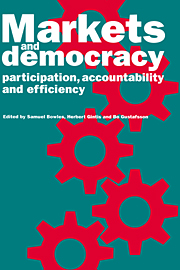Book contents
- Frontmatter
- Contents
- List of figures
- List of tables
- Preface
- 1 Post-Walrasian political economy
- Part I Agency, incentives, and democratic accountability
- Part II Institutions and institutional change
- Part III Conditions for the success of the democratic firm
- Part IV Productivity, distribution, and power
- Part V Ownership, participation and capital markets
- 14 The motivational role of an external agent in the informationally-participatory firm
- 15 Unstable ownership
- 16 The simple analytics of a membership market in a labor-managed economy
- Part VI Political democracy and economic democracy
- Bibliography
- Author index
- Subject index
14 - The motivational role of an external agent in the informationally-participatory firm
Published online by Cambridge University Press: 05 March 2012
- Frontmatter
- Contents
- List of figures
- List of tables
- Preface
- 1 Post-Walrasian political economy
- Part I Agency, incentives, and democratic accountability
- Part II Institutions and institutional change
- Part III Conditions for the success of the democratic firm
- Part IV Productivity, distribution, and power
- Part V Ownership, participation and capital markets
- 14 The motivational role of an external agent in the informationally-participatory firm
- 15 Unstable ownership
- 16 The simple analytics of a membership market in a labor-managed economy
- Part VI Political democracy and economic democracy
- Bibliography
- Author index
- Subject index
Summary
We need decentralization because only thus can we ensure that the knowledge of particular circumstances of time and place will be promptly used. But the man on the spot cannot decide solely on the basis of his limited but intimate knowledge of the facts of his immediate surroundings. There still remains the problem of communicating to him such further information as he needs to fit decisions into the whole pattern of changes of the larger economic system. (F. Hayek, 1945)
Introduction
This chapter deals with incentive issues involved in workers' collective participation in information-processing (e.g., problem-solving on manufacturing site, horizontal coordination, on-the-job learning, R&D) in the context of large firms. In exploring this theme, it specifically tries to make the following two points: first, the critical basis of “workers' power” in the firm in accord with internal and allocative efficiency lies not so much in the “democratic rule” per se that workers' majority voting (or unanimous will) is explicitly applied to management decisions (or selection of management) of the firm. Nor does it lie in the workers' exclusive property rights which allow them to appropriate all gains arising in the associated firm. Rather, workers' power is derived more fundamentally from their ability to generate information value through active, collective participation in information-processing within the firm. By “workers' power,” I mean their capacity to have due influence over management decisions relevant to their own economic welfare, learning opportunities, membership status in the firm, etc.
- Type
- Chapter
- Information
- Markets and DemocracyParticipation, Accountability and Efficiency, pp. 231 - 247Publisher: Cambridge University PressPrint publication year: 1993
- 2
- Cited by



